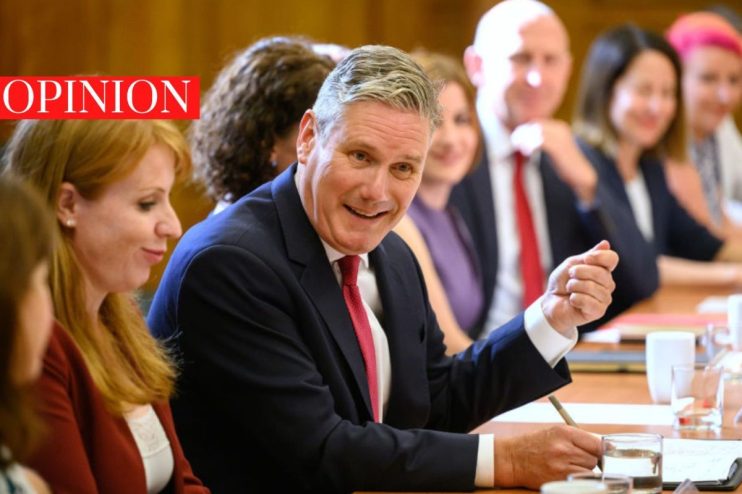Labour’s spending promises have been backed into a corner by a frail economy

Starmer’s U-turn on the charitable status of schools is the latest about-turn on key Labour policy as the party finds its commitments backed into a corner by a fragile economy, writes Eliot Wilson
Sometimes one can forget how much of a relative newcomer Sir Keir Starmer is. He has only contested three general elections, and it took him less than five years to go from making a solemn affirmation as a new MP to becoming leader of the Labour Party. While no one would accuse him of being flamboyant, there has been a certain dogged ruthlessness about the way has transformed the opposition in his three-and-a-half years as leader, and he has often reminded people that a party out of power is a party without a purpose.
Last week Labour rowed back on a policy which had seemed obviously popular. Last year, Starmer had announced that he would strip independent schools of their charitable status and therefore their exemption from VAT and business rates. He would use the revenue generated by the move to fund “catch-up” schooling for state pupils who had fallen behind; in January, the shadow education secretary, Bridget Phillipson, opened a debate in the House of Commons in which she affirmed that “the evidence for ending private schools’ tax breaks is very clear”.
Now the party has changed its mind, and schools’ charitable status will no longer be taken away if Labour wins the next election. Instead, a Starmer government will only remove their relief from VAT, but the leader stressed that this was not an ideological “attack on private schools”. After all, he spent some of his own youth at a fee-paying school in Surrey. Conservatives have not been slow to pick up on this volte-face, which certainly could be a mild embarrassment for Starmer, but it is not the first time he has reconsidered his policy pledges.
In fact the Labour platform for the general election has been quite heavily revised over the past few months. When he was running for the party leadership, Starmer pledged to scrap student tuition fees. However, in May he pointed to the “difficult financial situation” and promised instead that fees would be made “fairer”. His shadow chancellor, Rachel Reeves, pointed to the same reason in June for scaling back the party’s plans to borrow £28bn for a Green Prosperity Fund to invest in environmentally friendly technology. She explained that voters had to know that “Labour can be trusted with the public finances”, and that she hoped to bring in the fund during the lifetime of the next parliament.
It has not gone unnoticed that several policy proposals have been edged towards a window as if by Vladimir Putin. A plan to impose a 10 per cent digital services levy on big tech firms like Amazon and Facebook was quietly smothered, despite promising to raise £3.2bn, because the risk of a trade war with the US was too disruptive to contemplate. Equally, as part of his Labour leadership campaign, Starmer had pledged to abolish Universal Credit, that hated bogeyman of the austerity years; by January this year, the language had begun changing and UC will be “fundamentally reformed” instead. Again, the condition of the public finances is blamed.
Partly this reflects the intellectual delicacy (“flimsiness” would be unkind) of the current Labour régime. Starmer has, understandably, reacted against the Corbyn years by stating what he is not, but a cogent and distinctive ideological thread can sometimes be hard to discern. He has made substantial spending commitments, but talks the language of prudent public finance; of increasing funding for the NHS but also of institutional and cultural reform; he campaigned for a second referendum on Brexit, but now rules out revisiting the UK’s departure from the EU. His critics on the left accuse him of presenting a warmed-over form of Blairism, but there is not the sense of purpose and coherence which New Labour displayed with discipline, even ruthlessness.
Traditionally, the “U-turn” is a grave weakness in British politics, a charge which Margaret Thatcher rejected so imperiously at the Conservative Party Conference in 1980. Yet Starmer has performed a volte-face on issue after issue, while the Labour Party remains leagues ahead in the polls. If they are an ideologically mixed economy, tacking this way and that, the voters seem not to mind very much. This could reflect a new-found pragmatism and acceptance of political reality by the electorate, but it seems more likely that politicians are now held in such low esteem that no faith is put in anything they promise.
The odds remain extremely high that Sir Keir Starmer will be prime minister within a year or so, though it is not a dead certainty. The Conservatives will have done more to lose the election than Labour has to win it, but that is in the nature of politics. Nevertheless, we ought to be a little concerned that Starmer and his party will take office in the face of either disbelief or indifference towards what they actually want to do.